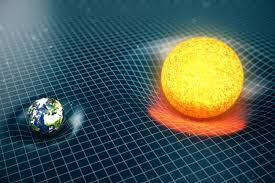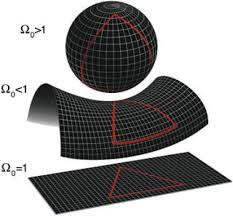He was never a Creationist.
Yet his tornado in a junkyard seems useful in certain contexts.
There have been recent findings that suggest that the Universe has a flat (or "saddle-shaped) geometry (instead of being curved into a hypersphere), and current thinking seems to point to the idea that the Universe will expand, run down, and reach a state of maximum entropy . . . which is often called the “heat death” of the Universe.
I have been playing with an idea (since I was a teenager) where “Hoyle’s Tornado” seems relevant to the Big Bang and the heat death of the Universe.
In order to show my argument, I need to point out that infinity is not a very large number. It is an endless number, and any number you show me–no matter how large–is not infinity, as it lacks the quality of endlessness that defines infinity.
In fact, the number 100 trillion is precisely as close to infinity as the number 1, even though this seems counter-intuitive and “goes against common sense.”
This means that if I randomly shuffle 100 billion decks of cards together and deal out poker hands for eternity . . . there will be an infinite number of occasions when I deal out 100 trillion royal flushes in a row, even if I have shuffled the cards fairly.
This seems relevant to the Big Bang and the heat death of the Universe, as I believe that the Universe has always been here. After all, if we believe that God has always existed, then let us save a step and assume that the Universe has always existed.
Also, if the Universe is in a state of maximum entropy as an endless space filled with elementary particles a fraction of a degree above absolute zero (and absolute zero can’t exist because of the consequences of quantum mechanics and the Uncertainty Principle), then I imagine that if we wait long enough, then these particles shuffle themselves randomly into a state of minimum entropy . . . and then we have a Big Bang.
So, I am arguing that the Big Bang is a statistical anomaly that is 100% likely to happen in an infinite amount of time, rather like the anology of shuffling 100 billion decks of cards together.
My argument is simple, it does away with the neccesity of God, it is consistant with the physical laws, and it gives us infinite regression into the past and infinite progression into the future.
It does–however–have flaws that I have not been able to reconcile.
If we picture the Big Bang explosion as a grenade that is suspend in a vast, empty room . . . the shrapnel from the exploding grenade would fly away from the center in a more or less symetrical manner. This means that an ant (assuming it lived) on a fragment of the grenade would see the other fragments in an arc around his point of reference, with no fragments above his head.
So, I would expect the galaxies to be distributed in a vast curve around the observable Universe if everything exploded from a common center in a vast, empty space . . . yet this isn’t the case.
Galaxies are distributed more or less randomly through the Universe, although they gravitationally influence each other into certain organizations like super clusters and galactic walls, which is inconsistant with my idea as I’ve presented it.
Also, my idea of the Big Bang being a random shuffling of matter as a statistical inevitability in an infinitely old Universe does not seem to account for dark matter.
Another objection (pointed out on this forum by Get Off My Lawn, although in a slightly different context from this post) is that if we use a statistical fluke to explain the Big Bang . . . then we must consider the implications of all possible statistical flukes equally, and some of these statistical flukes may lead to the disappearence of the Universe . . . which would mean that it shouldn’t even exist to begin with.
Yet I can’t let go of the idea, so I’ve been tweaking it for decades without resolving these objections.
Still . . . I believe that a random reshuffling makes sense when we consider the laws of thermodynamics, and while this may seem like something akin to a religious faith . . . I would rather have faith in thermodynamics than a God or gods.

